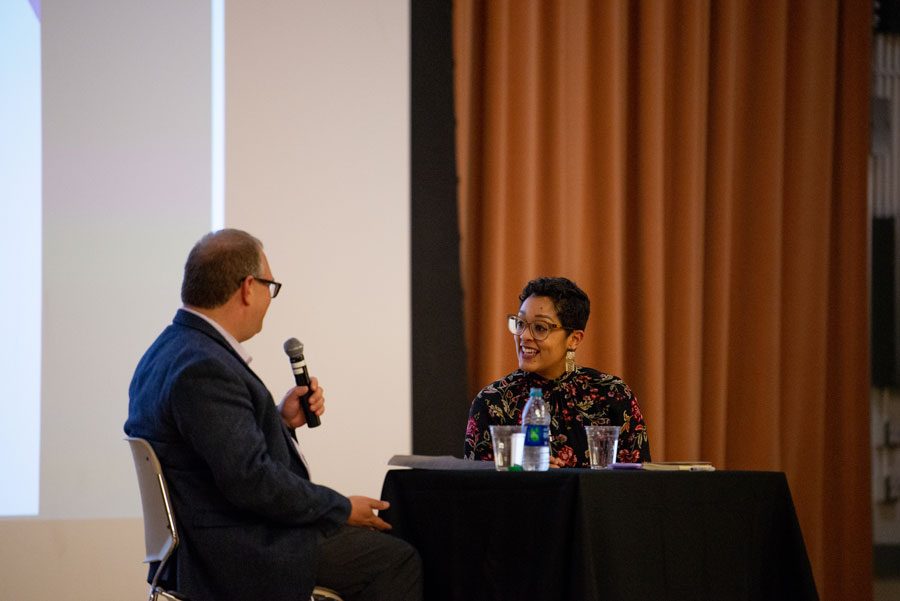Sociologist and writer Eve Ewing discusses racial discrimination in education
Dr. Eve Ewing. The sociologist and writer spoke on her experience as a woman of color in a primarily white University at a Tuesday event.
April 16, 2019
Dr. Eve Ewing spoke openly of leadership and racial discrimination within the modern education system as a part of the Nancy and Ray Loeschner Leadership series Tuesday.
An assistant professor at the University of Chicago, Ewing is a sociologist, poet, writer, and scholar. She authored “Ghosts in the Schoolyard: Racism and School Closings on Chicago’s South Side,” tackling issues of systemic inequalities within public education. She also co-wrote “No Blue Memories: The Life of Gwendolyn Brooks,” a play depicting the American poet’s life, and has written for Marvel Comics.
The event, held in the Ryan Auditorium, featured SESP Dean David Figlio as moderator. The two conversed wittily, bantering on topics ranging from churros to the Northwestern-UChicago rivalry. The Dean labeled her a “true SESPian” and jokingly offered her a job within his department.
Although she laughed freely and provided comic relief often, Ewing also spoke seriously and passionately about issues of leadership and injustice, sharing personal experiences and making herself vulnerable to illustrate her ideas.
Ewing said she faced severe challenges as a person of color in a predominantly white and inherently racist educational institution as an undergraduate student at the University of Chicago. She said incidents of racial trauma she experienced during her college years led to severe mental breakdowns, and repeated thoughts of dropping out.
“My second year there was a group of students in my house who threw a party, the theme of which was ‘Straight Thug and Ghetto Party.’ I was the only black resident in this house of about 100 people,” Ewing said.
As an undergraduate, Ewing said, she channeled her frustration and pain into conversations with her peers, attempting to explain why this kind of racist behavior was hurtful towards her.
“I put a lot of time and emotional energy into it,” Ewing said. “But I was internally falling apart at the same time.”
Ewing said this experience, as well as others, taught her an important lesson: it is not the job of primarily white institutions to love her. Instead, she said she believes it is her own responsibility to surround herself with people who support and want the best for her.
As a professional, Ewing holds a similar belief — she focuses on issues of her own community, instead of institutions unpreoccupied with her well-being.
“My task is not to individually transform institutions that have been racist for a long time,” Ewing said. “I am concerned with my people in my city and what I can do with my limited time on this planet for them, for us.”
Both students and administrators said they were excited to hear her speak. The audience filled about three-fourths of Ryan Auditorium.
“I first learned about her through her prolific Twitter account,” said Anne Conlon, the executive assistant to Northwestern’s vice president for international relations. “She is such an amazing activist and advocate for so many important issues that I care about.”
And Ewing did not disappoint, Amulya Angajala (McCormick ‘18) said. After the talk, audience members crowded to the front of the auditorium for a chance to speak with her.
Angajala said she particularly enjoyed the realistic way in which Ewing approached issues of social justice.
“Social justice work frequently has a note of positivity, as everything can be solved if we all put enough work in,” Angajala said. “As much as I want to believe that, I really appreciated how she was pragmatic about what can reasonably be changed.”
Email: [email protected]


